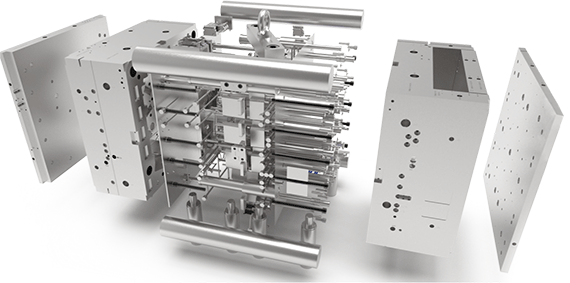Definiția matrițelor de injecție de precizie Știți cu adevărat?
Definiția matrițelor de injecție de precizie este determinată în funcție de doi indicatori, unul este precizia echipamentului de prelucrare, iar celălalt este eroarea cauzată de prelucrarea matriței. Nivelul cuprinzător al unei mașini de turnat prin injecție este determinat de eroarea de greutate a turnat prin injecție . Eroarea este mai mică de 0,5% pentru mașina de turnare prin injecție de precizie, eroarea este mai mică de 0,3% pentru mașina de ultra-precizie, iar mașina cu eroarea de aproximativ 1% este mașina obișnuită de turnare prin injecție. Începând cu stadiul actual al tehnicii, cea mai precisă mașină de turnare prin injecție din lume poate realiza o eroare mai mică de 0,15%.
Precizia matriței prelucrate este afectată în principal de mai mulți factori:

AS resin has a strong load carrying capacity, chemical resistance, thermal deformation resistance and geometric stability. The addition of a glass fiber additive to the AS resin increases the strength and resistance to thermal deformation and reduces the coefficient of thermal expansion. The Vicat softening temperature of the AS resin is about 110 °C. The deflection temperature under load is about 100 °C. The shrinkage of the AS resin is about 0.3-0.7%. AS resin is a hard, transparent material. The styrene component makes the AS resin hard, transparent and easy to process; the acrylonitrile component makes the SAN (AS) chemically and thermally stable.
The processing temperature of the AS resin is generally from 200 to 250 ° C. The material is easy to absorb moisture and needs to be dried for more than one hour before processing. Its fluidity is slightly worse than PS, so the injection pressure is slightly higher. Drying treatment If the storage is not suitable, the AS resin has some hygroscopic properties. The recommended drying conditions are 80 ° C for 2-4 hours.
The melting temperature is 200-270 °C. If a thick walled product is processed, a melting temperature below the lower limit can be used.
Injection pressure 350-1300 bar Injection speed High-speed injection is recommended
Runners and Gates All conventional gates can be used. The gate size must be appropriate to avoid streaks, freckles and voids.
Dacă vă putem ajuta cu proiectul dumneavoastră vă rugăm să ne sunați la 0086-769-82821468 sau e - mail sales@kaitomould.com.



